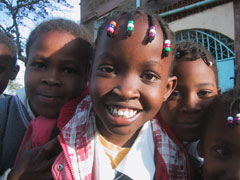International Youth Day - August 15, 2006

|
| Source: Johns Hopkins University |
International Youth Day presents an opportunity for all stakeholders to address issues of imminent concern to youth around the world. This year's theme is “Tackling Poverty Together: Young People and the Eradication of Poverty.”
The United Nations Millennium Development Goals – the international community's agreed-upon targets for eliminating extreme poverty – were not originally developed with a focus on young people. However, the successful achievement of these goals requires donors and policymakers to focus their attention on youth. Young people make up a sizable portion of the world's poor, and they both affect and are affected by the goals. Young people growing up in poverty face greater health risks, including increased reproductive health risks, and are much less likely to complete primary school, find adequate livelihood, or provide good care and support to their children. In addition, early childbearing among the poor – especially among youth ages 15 to 19 – is associated with negative economic effects and poor maternal and neonatal health outcomes.
USAID's Office of Population and Reproductive Health supports many programs to improve the reproductive health of young people in the developing world, including activities to reduce early childbearing and HIV infection among adolescents. The current USAID-funded YouthNet project, whose purpose is to improve the reproductive health and HIV/AIDS prevention behaviors of young people ages 10 to 24, works to improve policy and increase local support for reproductive health and HIV prevention and to improve knowledge, attitudes, and skills related to healthy reproductive health practices. YouthNet works in numerous developing countries around the world, including Tanzania, Ethiopia, Zambia, Mali, and Senegal.
Additional USAID programs include:
- A youth-friendly pharmacy network model in India to address the family planning needs of married adolescents, a segment of youth that is largely ignored. This activity will be implemented through a public-private partnership that will aid in supporting the model's sustainability.
- A program to address the reproductive health needs of very young adolescents (ages 10 to 14) in Peru and Madagascar. This program aims to increase knowledge about the body, fertility, and gender roles and build negotiation and communication skills among very young adolescents. Knowledge and skills acquired during this developmental stage can promote behaviors that result in healthy outcomes as these young people enter adolescence and adulthood.
USAID Missions also provide direct support to youth programs in their host countries.
|


